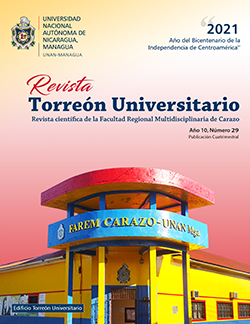Competency Training for University Teachers: FAREM-Carazo Case
DOI:
https://doi.org/10.5377/rtu.v10i29.12718Keywords:
competences, higher education, teacher trainingAbstract
This research is based on the needs to define the competency profile of the professors of this Faculty and based on this competency profile to design a competency-based training plan according to their needs, proposing as a general objective: To design a proposal for teacher training by competencies in the face of the new demands of the environment and cyber society for the FAREM-Carazo of the UNAN-Managua. This training proposal takes into account the demands of teaching skills associated with knowledge, know-how, know-how, know-how to learn, know how to know how to learn and know how to unlearn. It was based on a reflective inquiry, forming discussion groups between teachers and experts and later came to the awareness of what you want to transform in a certain moment and situations. It is developed a mixed study methodology, performing a triangulation of data and methods, through the semi-structured interview with expert teachers, questionnaires applied to teachers and students of the Faculty and subsequently the Delphi method used to validate the thesis was used. It was identified the role of the university and teachers, also evidenced the prevailing need to propose a training program by teacher competencies, based on the needs of its own teaching staff, which expressed a lack of generalized knowledge, expressing a wide willingness to be trained in skills. At the same time, it was possible to validate the necessary teaching skills in the face of the new challenges, which were included in the Proposal for Training by Competencies of university professors of the FAREM-Carazo.
Downloads
References
CRES 2018. (s.f.). Declaración III Conferencia Regional de Educación Superior para América Latina y el Caribe. Córdoba. Obtenido de http://www.cres2018.org/biblioteca/declaracion-final-cres-2018
Domínguez Fenández, G. (2013). El puesto de desempeño (perfil) del formador y los procesos de enseñanza-aprendizaje (funciones y competencias profesionales). Sevilla, España.
Domínguez Fernández, G. (2013). El perfil y Funciones del Formador. Modelos docentes y su aplicación al Currículum. España.
Domínguez, G. y Prieto, E. (2014). Modelos y paradigmas de educación. Funcionamiento de un programa de intervención y perfil del educador/a. La dimensión microdidáctica o de intervención educativa. Material para Doctorado en Educación e Intervención Social. UNAN-Managua. Sevilla: Universidad Pablo de Olavide.
Domínguez Fernández, G., Prieto Jiménez, E., & Álvarez , F. (2019). LAS SITUACIONES REALES DEL DOCENTE COMO ESTRATEGIA DE APRENDIZAJE INICIAL DEL PROFESORADO DE SECUNDARIA: EL MODELO SIRECA. Profesorado. Revista de currículum y formación del profesorado, 129-149.
Escobar-Pérez, J., & Cuervo-Martínez, Á. (2008). Validez de contenido y juicio de expertos: una aproximación a su utilización. Avances en Medición, 27–36. http://www.humanas.unal.edu.co/psicometria/files/7113/8574/5708/Articulo3_Juicio_de_expertos_27-36.pdf
Ferrada, D. (2017). Formación docente para la universidad. Revista Mexicana de Investigación Educativa, 783-811. https://www.redalyc.org/pdf/140/14053215006.pdf
García Sánchez, M., Reyes Añorve, J., & Godínez Alarcón, G. (2017). Las Tic en la educación superior, innovaciones y retos. Revista Iberoamericana de las Ciencias Sociales y Humanísticas, 1-18. https://www.redalyc.org/pdf/5039/503954320013.pdf
Hernández Sampieri, R., Fernández Collado, C., & Baptista Lucio, M. d. (2014). Metodología de la Investigación. México: Mc Graw Hill.
Imbernón, F. (2016). Los retos educactivos del presente y del futuro. La sociedad cambia, y el profesorado? Revista Internacional de Formação de Professores, 121-129. https://www.researchgate.net/publication/333650911_los_retos_educativoS_del_presente_y_del_futuro_la_sociedad_cambia_y_el_profesorado
Imbernón, F. (2019). La formación del profesorado de educación secundaria: la eterna pesadilla. Profesorado. Revista de currículum y formación del profesorado, 151-163. https://recyt.fecyt.es/index.php/profesorado/article/view/74488
Naciones Unidas. Objetivos de Desarrollo del Milenio Informe 2015. New York: ONU; 2015. Disponible en: http://www.un.org/es/millenniumgoals/pdf/2015/mdg_2015_s_summary_web.pdf [ Links ]
Naciones Unidas (2018), La Agenda 2030 y los Objetivos de Desarrollo Sostenible: una oportunidad para América Latina y el Caribe (LC/G.2681-P/Rev.3), Santiago
Tuapanta Dacto, J. V., Duque Vaca, M. A., & Mena Reinoso, A. P. (2017). Alfa de Cronbach para validar un cuestionario de uso TIC en docentes universitarios. Revista mktDescubre, 37 - 48. http://revistas.espoch.edu.ec/index.php/mktdescubre/article/view/141
Salazar G. & Tobón, S. (2018). Análisis documental del proceso de formación docente acorde con la sociedad del conocimiento. Revista Espacios Vol. 39 (Número 53) Vol. 39 (Número 53) Pág. 17-20.
Tobón, S. (2006). Aspectos básicos de la formación basada en competencias. Talca: Proyecto Mesesup. https://maristas.org.mx/gestion/web/doctos/aspectos_basicos_formacion_competencias.pdf
Tobón , S. (2017). Conceptual analysis of the socioformation according to the knowledgesociety. Knowledge Society! and Quality of Life, 9-35. https://issuu.com/cife/docs/essential_axes_of_knowledge_society
Tobón, S., Gonzalez, L., Nambo, J., & Vazquez Antonio, J. (2015). La Socioformación: Un Estudio Conceptual. Paradigma, 7 – 29. http://ve.scielo.org/scielo.php?script=sci_arttext&pid=S1011-22512015000100002
UNESCO. (2009) Conferencia Mundial sobre la Educación Superior 2009 Paris Francia
Published
How to Cite
Issue
Section
License
Copyright (c) 2021 Universidad Nacional Autónoma de Nicaragua-Managua,

This work is licensed under a Creative Commons Attribution-NonCommercial-NoDerivatives 4.0 International License.
Los autores que publican en esta revista están de acuerdo con los siguientes términos.
- El autor o los autores de los artículos, ensayos o investigaciones conceden a la Universidad Nacional Autónoma de Nicaragua, Managua (UNAN-Managua) los derechos de edición (copyright) del trabajo enviado, por consiguiente la Universidad cuenta con el derecho exclusivo para publicar el artículo durante el periodo completo de los derechos de autor.
- Estos derechos de autor/ autores autorizan a la Revista Torreón Universitario y a la Universidad editar y divulgar/publicar el artículo en dicha Revista, incluyendo reproducción impresa y electrónica, el almacenamiento, recuperación y cualquier otro tipo de publicación, y fuentes de información secundaria como servicios de resúmenes y bases de datos, así mismo la facultan a proteger el artículo contra el uso no autorizado para su difusión por medios impresos o electrónicos (PDF, HTML, EPUB, XML u otros).
Licencia para el uso del contenido
La revista hace uso de la Licencia Creative Commons Atribución-NoComercial-SinDerivar 4.0 Internacional.
Bajo esta declaración:

Este revista está sujeta a una licencia de Creative Commons Reconocimiento-NoComercial-SinObraDerivada 4.0 Internacional. Puede ser copiada, distribuida y transmitida públicamente siempre y cuando se cite al autor y la fuente (Revista Torreón Universitario), no debe modificarse ni utilizarse con ningún fin comercial. La licencia completa se puede consultar en http://creativecommons.org/licenses/by-nc-nd/4.0/.

